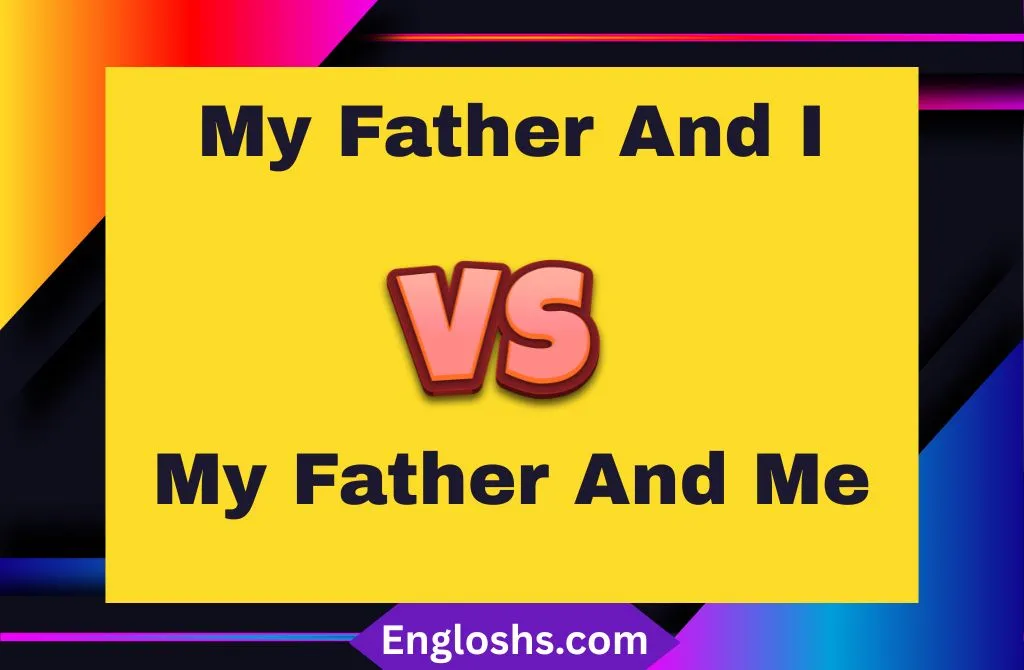Many people stumble over whether to say “My father and I” or “My father and me.” It’s a common question, and one that can trip up even native English speakers.
Getting this right isn’t just about sounding polished; it’s about clear communication. The difference hinges on understanding how subject and object pronouns work in English—and when to use each correctly.
Let’s break it down so you can navigate this grammar puzzle with confidence.
Understanding Subject and Object Pronouns in English
English uses different pronouns depending on the role they play in a sentence: subjects or objects.
- Subject pronouns perform the action: I, you, he, she, it, we, they
- Object pronouns receive the action: me, you, him, her, it, us, them
Examples:
- Subject: I went to the store.
- Object: He saw me at the store.
The key is to know whether the pronoun is doing the action (subject) or receiving it (object). This will help you decide between “I” and “me.”
The Correct Cases: “My Father and I” Versus “My Father and Me”
When combining pronouns with nouns like “my father,” it’s crucial to keep the pronoun’s case consistent with its function.
- Use “My father and I” when the phrase acts as the subject of the sentence.
- Use “My father and me” when it acts as the object of the sentence.
Examples:
- Subject: My father and I are going fishing.
- Object: She invited my father and me to the party.
Tip: Try removing “my father and” and see if the sentence still sounds right. For example, “I am going fishing” (correct) vs. “Me am going fishing” (incorrect). This quick trick makes it easier to choose the right pronoun.
When to Properly Use “My Father and I”
Use “My father and I” when the phrase is the subject of the verb, meaning it performs the action.
- My father and I walked to the park.
- My father and I will attend the meeting.
This is because “I” is a subject pronoun, and it should be used when it is the one doing the action alongside “my father.”
Appropriate Usage of “My Father and Me”
Use “My father and me” when the phrase is the object, meaning it receives the action of the verb or preposition.
- The teacher called my father and me.
- She gave the tickets to my father and me.
In these cases, “me” correctly acts as the object, either of the verb (called, gave) or a preposition (to).
Polishing Your Grammar: Tips for Remembering the Rules
- Test by removing “my father and”: If you wouldn’t say “me” alone in the sentence, don’t use it with “my father.”
- Identify the verb’s actor: Ask yourself who is doing the action (subject) or who is receiving it (object).
- Watch out for prepositions: Words like to, for, with always require the object form (“me”).
- Practice with examples: The more you read and write correctly, the more natural it becomes.
Common Misconceptions and Correcting Common Errors
A common mistake is saying “Me and my father” as the subject, which sounds informal but is grammatically incorrect. Some people also confuse cases when the phrase is part of a compound object.
Examples of errors:
- Me and my father went to the store. (Incorrect)
- She gave it to my father and I. (Incorrect)
Correct versions:
- My father and I went to the store.
- She gave it to my father and me.
Why “Me and My Father” Is Often Misused
People often say “Me and my father” because it sounds conversational and less formal. It may also stem from placing oneself first in the phrase, which some speakers prefer in casual speech. However, in formal writing and speech, this should be avoided.
Remember, “I” is never used as the object, and “me” is never used as the subject. Misusing these pronouns can distract readers or listeners and may undermine your credibility.
The Role of Context in Choosing ‘I’ or ‘Me’ With Family References
Sometimes, the choice between “my father and I” and “my father and me” depends on subtle context cues beyond just subject or object roles. For instance:
- After prepositions like with, to, for, you always use “me.”
- When the phrase is part of a compound subject or compound object, keep the case consistent with the sentence’s main verb.
- In informal conversation, people might bend the rules, but writing requires clarity.
In summary:
- Use “My father and I” as the subject.
- Use “My father and me” as the object.
- When in doubt, test the sentence by removing “my father and.”
Mastering this simple rule will make your English sound natural and grammatically correct. So next time you’re unsure whether to say “my father and I” or “my father and me,” just remember: who’s doing the action? That’s your clue!
Ready to put this into practice? Try these sentences:
- _____ went to the game with you. (My father and I / My father and me)
- She gave the award to _____. (My father and I / My father and me)





